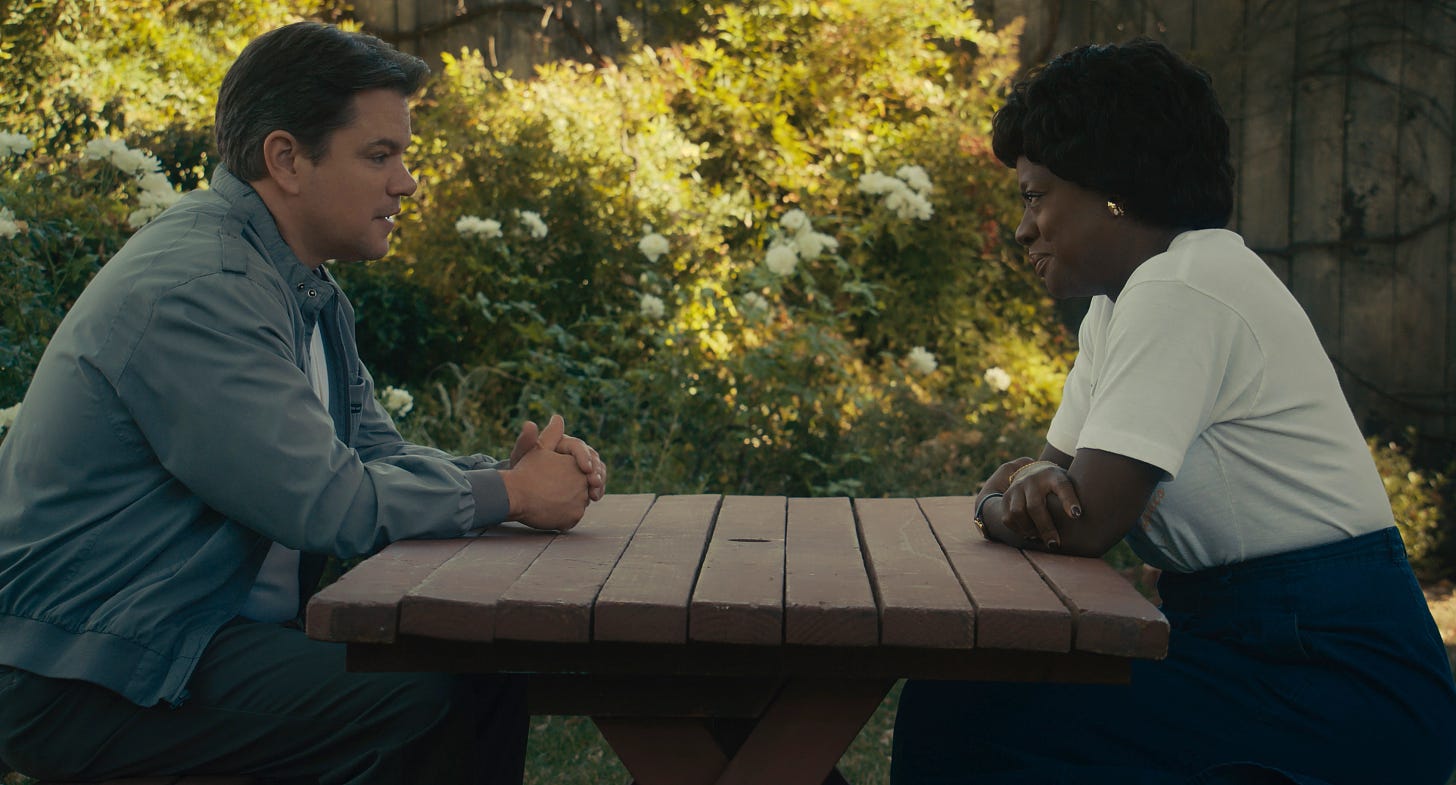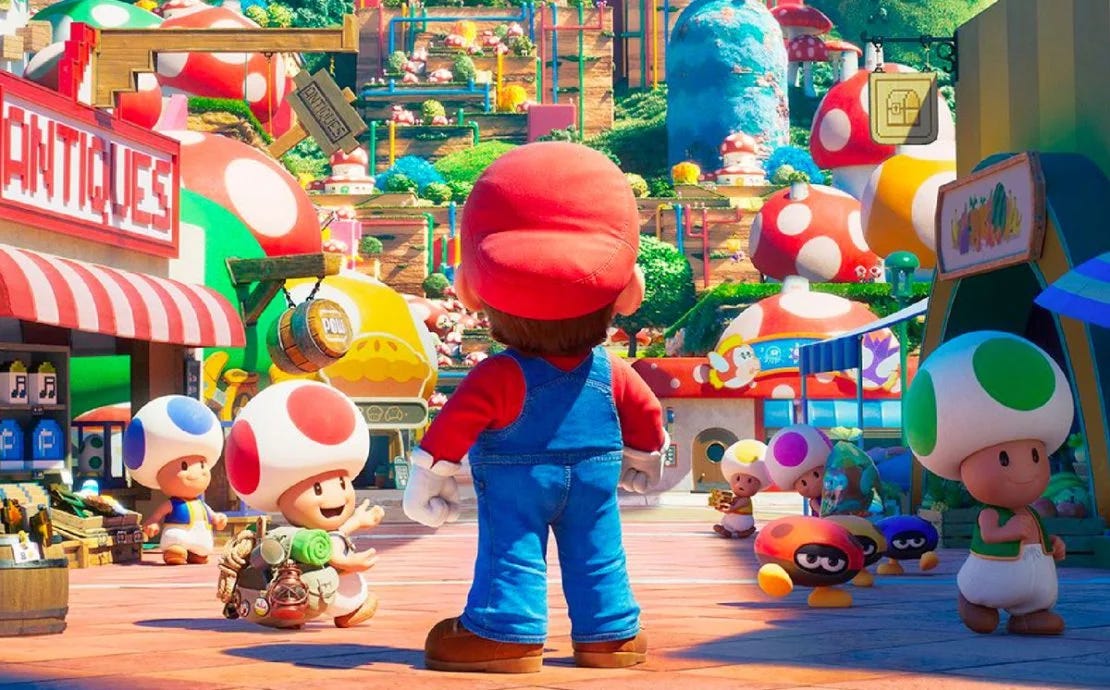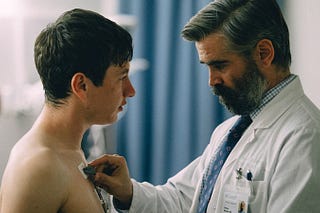
In Review: 'Air,' 'The Super Mario Bros. Movie'
The brands are out in force as Ben Affleck documents a key moment in Nike history and a Nintendo classic gets another shot at big-screen immortality.
Air
Dir. Ben Affleck
112 min.
A twist on the underdog sports movie, Ben Affleck’s Air is a supremely confident and witty piece of studio entertainment where the sports are relegated to game tape and the underdog is a pasty shoe executive with a pager that sticks out as prominently as his microwave-dinner gut. In fact, it’s so confident and witty that it takes some time to remember that Air is about a milestone in corporate branding, a shoe so spectacularly profitable that it forever changed the fortunes of a company, a league and the greatest basketball player ever.* A lot of people got very, very rich, and most of them were already living comfortably or indulgently or were well on their way to that destination. Perhaps fitting for a film set in the mid-’80s, it’s a celebration of wealth creation as conspicuous as Phil Knight’s custom-painted purple Porsche.
And yet, that’s a swindle that Air pulls off effortlessly, because Affleck and his star, Matt Damon, are professional salesmen who believe their own pitch. In their hands, a thought like, “Wait, is this really the feel-good story of guys making obscene amounts of money off a sneaker?” becomes what another ’80s triumph, Raising Arizona, dubbed a “way-homer.” It is instead, sincerely and persuasively, a story about a gambler and a dreamer staking his career—and those of several others—on his instinct that Michael Jordan, a rookie out of North Carolina, was the most special talent he’d ever encountered. His conviction animates the film, and the fact that we know he’s right adds urgency, like Christopher Walken having a vision in still another ’80s triumph, The Dead Zone.
It wasn’t obvious to everyone in 1984 that Jordan was destined for greatness. The Houston Rockets took future Hall of Famer Hakeem Olajuwon at #1, but the Portland Trail Blazers opted for another center, Sam Bowie, with the second pick, leaving the Chicago Bulls to land Jordan at #3. And when it came to shoe endorsements at the time, Nike was also #3, trailing far behind Converse and Adidas, which had the additional cache of getting name-checked in a Run D.M.C. song. When Air opens, Nike’s small basketball braintrust is drearily sorting through the draft prospects, looking to spread its $250,000 budget to three names on the board, hoping that one of them pops. Sonny Vaccaro (Damon), the company’s chief talent scout, is too depressed by the process even to stay in the room.
Retreating to watch game film in the dark, cluttered hobbit holes of his office and home, Sonny becomes so enamored of Jordan that he wants to spend the whole budget trying to land him, despite Jordan’s much firmer ties to Adidas. After getting word that MJ’s mother Deloris (Viola Davis) exercises enormous influence over her son’s decision-making, Sonny turns up at her doorstep in North Carolina to make his pitch, which is not about the money, but an acknowledgement that they see the same greatness. But that’s just the opening salvo in a sneaker war that would prove globally consequential.
Though Affleck mashes the “I Love the ’80s” button too hard—the opening credits are a crude montage of cultural signposts—Air affirms that the director of Gone Baby Gone, The Town and Argo remains a sturdy craftsman who’s particularly good at working with other actors. Damon does a less daft version of his Midwestern office schlub from The Informant! and Chris Messina stands out as Jordan’s exceedingly spicy agent, who seems capable of verbally stabbing his adversaries to death. But it’s Davis who brings Air the gravitas it desperately needs. With Jordan himself kept deliberately out of view, it’s Deloris who approaches these negotiations with passion and savvy, as a mother who knows what her son is worth. Of course, it’s a parent’s job to think their kid is the best—she just happened to be right. — Scott Tobias
(* I’m a LeBron James guy, but I acknowledge that Jordan tends to get the GOAT designation and does so here.)
Air opens tomorrow in theaters everywhere.
The Super Mario Bros. Movie
Dir. Aaron Horvath, Michael Jelenic
92 min.
Released in the summer of 1993, Super Mario Bros. is both the first film based on a video game and one of the worst in what would become a long, largely dubious tradition. Starring Bob Hoskins and John Leguizamo as plumbers-turned-heroes forced to do battle with archfoe King Koopa (in the form of reptilian Dennis Hopper), it plays like a fumbling attempt to pound a bunch of required game elements into something recognizably movie-shaped. It’s not good, by any stretch of the imagination, but it does have its own, weird integrity. There’s a kind of nobility to the way it commits to an impossible task.
Nearly 30 years later, that makes it a fascinating contrast to The Super Mario Bros. Movie, a slick, empty, but breathtakingly competent animated film from Illumination that spans the extended galaxy of Nintendo’s Mario and Kong games. In broad strokes, the plot isn’t that different from the first Super Mario Bros. film. Mario (voiced by Chris Pratt, for no particular reason) and Luigi (Charlie Day) are, again, Italian-American Brooklyn plumbers unexpectedly drawn into a strange world filled with weird creatures. But their journey takes the form of countless IP-driven contemporary blockbusters, a road-tested mix of fight scenes, a loser-learns-to-believe-in-himself journey of self-discovery, a touch of irreverence, and knowing nods to the source material.
In fact, there are so many knowing nods that those familiar with the games might leave the film with a neckache. At times resembling a movie version of the Pointing Rick Dalton meme, The Super Mario Bros. Movie fills the frame with Easter Eggs and homages and sometimes even lets the movie mimic the experience of playing one of the games that inspired it. That’s reasonably clever at first, as in an early scene that mimics that side-scrolling action of the first Super Mario Bros. games as the heroes journey to a plumbing job by jumping on a variety of platforms to vault over obstacles, but it quickly becomes exhausting.
Really, the whole film is pretty exhausting. The searing colors and cranked-up energy that makes the games fun becomes wearying when stretched to feature length for passive spectators who have no choice in, say, what color of a kart Mario races across Rainbow Road. Only a few moments, like King Koopa (Jack Black) plaintively plucking out the familiar music that plays when Mario’s in trouble as if he was making it up on the spot, make it recognizably the work of co-directors Aaron Horvath and Michael Jelenic, the creators behind the clever (and equally but less distractingly self-referential) Teen Titans Go! One other highlight: a cheerfully nihilistic blue star who grins and sparks as he talks about “the sweet relief of death.” Maybe he just wants out of the movie. A Google search reviews the little guy to be a character named Lumalee. Here, at least, Lumalee has the right idea. —Keith Phipps
The Super Mario Bros. Movie is now in theaters.




















Man, the existence of Air just frustrates me. I LIKE going to see, as Scott calls it, a "supremely confident and witty piece of studio entertainment." We need more of those! But man do I find it off-putting to go see something where I am expected to cheer for a successful marketing campaign from a giant corporation. It sounds like the film version of the endless parade of motivational business books that get trotted out by CEOs and Sales Directors everywhere for motivational reading for their teams.
In perhaps no so shocking news, the entire sales division at my company is going to see this movie this week as a "team activity."
after seeing Air, i was expecting more comparisons (not just here) to Ford v Ferrari, another movie in the same vein: a plucky young upstart giant corporation going up against an even giant-er corporation.